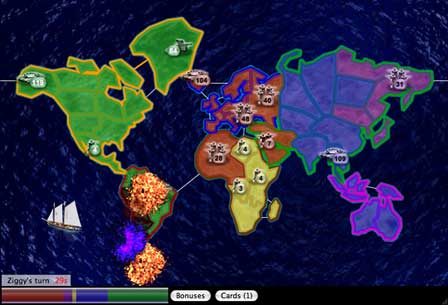- 2005.08.29
Now that I'm older, I can't even watch Halo, let alone play it
successfully. So I looked for something that took a little more
strategy and a little less twitching - and I found a couple of games I
have really enjoyed over the past few months.
Lux is one of several Risk™-type world domination games you
can find online to try. Some of them are prettier, but I don't think
any of them play as well as Lux.
Lux is made by Sillysoft and runs on Windows, Linux, and Mac
OS X. A free download is available so you can try it out. Players
log in online (or you can play against the built-in bots), and players
take turns just like the board game.
Many of the tedious parts of playing real Risk have been eliminated.
You can move entire batches of armies at once, have the computer
auto-place armies to start games faster (you can also place armies
manually, but almost no one does it), and automatically advance all
your troops when a country is conquered.

Users register and can create an online identity that tracks the
number of wins and losses and provides rankings. Rankings are regularly
erased to encourage continuous play, but past rankings are used to
determine seeds, which are evaluations based on play over time. A
seeded player has been in the top 100 or so players online for several
weeks in a row and is usually someone to be reckoned with.
I found the Lux online community generally pleasant to play with,
especially the experienced players. Occasionally newbs will do things
like commit suicide for revenge. When hosting, poor gamesmanship
sometimes results in games being dropped by the host - or when the host
is inexperienced, when the host is losing. Such behavior quickly
results in multiple posts on the Lux message boards hosted by
Sillysoft, and top players avoid such hosts.
While some games do hang or freeze, recent revisions to the game are
much more stable and such events seem to be much less frequent than
when I first started playing.
The graphics of the game are simple (armies are represented by
numbers), and the limited graphic display shows blasts and clouds of
smoke during battles (no more spitting on the board - oh wait, not
everyone used to do that -never mind). However, the game response is
excellent, and lag is pretty rare.
The game undergoes regular revision and notifies you when a new
user-created map is available. Gamers have added maps of real and
imaginary countries, odd geometrical patterns, and variations on the
classic game such as changing the number of countries (one map has
every country in existence) and changing the number of armies awarded
for a continent.
If you loved Risk as a board game, you're going to like Lux. Give it
a try.
One of the nicest things about the online Lux community is that they
persistently and stridently urge new players to pay the registration
fee ($25), and it seems quite a few people have. Eventually, all games
run their course, and after playing for several months I let my
(moderate) rankings lapse and moved on. The money I spent registering
Lux was well spent, in my opinion, and every now and then I stop by and
say hi to the old gang.
In my next game review (my second - I don't play a lot of games, so
when I pay for one, I wear it out) I'll talk about a game I really like
called Massive Assault. Look for that in a few days.
is a longtime Mac user. He was using digital sensors on Apple II computers in the 1980's and has networked computers in his classroom since before the internet existed. In 2006 he was selected at the California Computer Using Educator's teacher of the year. His students have used NASA space probes and regularly participate in piloting new materials for NASA. He is the author of two books and numerous articles and scientific papers. He currently teaches astronomy and physics in California, where he lives with his twin sons, Jony and Ben.< And there's still a Mac G3 in his classroom which finds occasional use.



